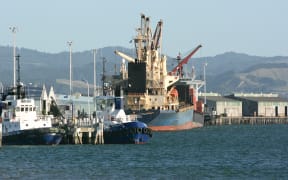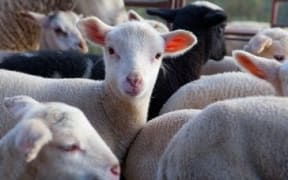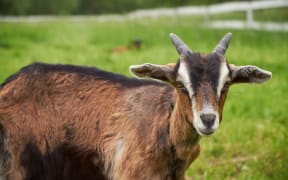Federated Farmers says the live sheep shipment headed to Mexico will help that country restock following a serious drought as well as farmers hit by drought here.
However, an animal welfare group and the Green Party have expressed concerns.

Livestock carrier NADA at PrimePort Timaru Photo: Supplied
The shipment left Timaru this morning and, at 50,000, is New Zealand's largest-ever live sheep export. Three thousand cows are also being shipped to Mexico.
Timaru's PrimePort said the vessel left on its two-week journey an hour and a half behind schedule.
The Ministry for Primary Industries (MPI) said the animals were being sent to Mexico for breeding purposes and not for slaughter. Shipments of live animals for slaughter is banned.
Federated Farmers meat and fibre chairman Rick Powdrell said it was a win for both parties with the Mexicans needing new stock and farmers here keen to sell, also due to drought.
"If they need to be rebuilding their flock, and at the moment you know we've got farmers in Canterbury who are happy to take up this opportunity to help themselves ease their situation and help the Mexicans out."
Mr Powdrell said fears about the welfare of the sheep were misplaced.
Hundreds likely to die - SAFE
However, animal rights group SAFE fear many animals will not survive the trip.
SAFE director Hans Kriek said there was no guarantee what would happen to the animals once they got to Mexico - and it was certain many would die on the way.
"Exporters often talk that a successful export has mortality less than 2 percent, or sometimes less than 1 percent," he said. "But even if that's the case, even in a good case, it means that 1 percent of animals dies, so that means that in this case 500 animals die over the next two weeks - that can't be acceptable."
Mr Kriek said there was no guarantee the export animals would not be resold in Mexico and then slaughtered.
Green Party co-leader James Shaw also feared the animals may instead be killed.
He said he had no evidence of that, but said unanswered questions about sheep which were sent to Saudi Arabia cast a pall of suspicion over the shipment.
PM, officials confirm welfare conditions
Retired vet Peter Jerram said, in 1991, he travelled on a ship to the Middle East carrying more than 110,000 live sheep, of which 2000 died.
He said his report at the time detailed the harsh conditions, including overheating in hot climates, too little room for the sheep to move, and a build-up of toxins from excrement.
He said the vet on board the ship bound for Mexico would not be able to prevent any deaths.
But MPI said the shipment had to meet strict animal welfare conditions - which has been confirmed by Prime Minister John Key, who spoke at the National Agricultural Fieldays yesterday.
"They have to meet all the conditions set by MPI, the welfare standards have to be met and there's a vet that's travelling with the sheep."
He also said the exports would help farmers in both countries:
"The Mexicans had a huge drought, so a lot of their breeding stock were wiped out, so they've asked us to send these sheep," he said.
"It's kind of a win-win because they've come from parts of the South Island where there have been droughts, so the farmers have been keen to sell those sheep."





